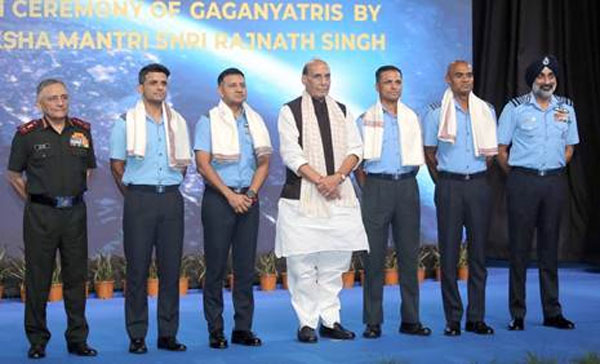Daijiworld Media Network - New Delhi
New Delhi, Aug 24: Defence minister Rajnath Singh has described India’s Gaganyaan Mission as far more than a scientific feat, calling it a defining chapter in the journey of a self-reliant India and a beacon of human progress. Speaking at a felicitation event at the Air Force Auditorium in Delhi, Singh praised the mission as a symbol of India’s ascent among the world’s elite space powers — one that carries not just national pride but also the hopes of humanity.
Addressing the gathering, which included Chief of Defence Staff General Anil Chauhan and Air Force Chief A.P. Singh, Singh commended Group Captain Shubhanshu Shukla, one of the Gaganyatris, for an achievement both symbolic and scientific: cultivating fenugreek and green gram in space. “The farmer in you stayed alive even in orbit,” Singh told Shukla, hailing the feat as a groundbreaking step that connects India’s agrarian heritage with its cosmic ambitions.

He framed Shukla’s journey as an inspiration for future generations, saying, “When Shubhanshu went into space, he didn’t just wear the uniform of the Air Force — he represented all of humanity.” His successful mission, completed with only two-and-a-half months of training instead of the usual two years, was highlighted as a testament to Indian resolve, discipline, and capability.
Rajnath Singh emphasized that space exploration, for India, is not limited to technological demonstration or military strategy. “Our presence in space — from the Moon to Mars — reflects the collective dreams of our nation,” he said. “Gaganyaan is not just about science. It is a declaration that India, with limited resources, can push beyond boundaries through limitless determination.”
He drew attention to the practical impact of space technology in everyday life, from disaster management and communication to its role in agriculture and rural development. Looking ahead, Singh envisioned space as the future of energy, security, and economic transformation — and stressed that India must not just participate, but lead.
Recalling his recent visit to the Institute of Aerospace Medicine, Singh said he was moved by the environment that fosters such excellence. Shukla, he said, stands as a “living embodiment of that training and courage — a symbol of India’s soil, discipline, and strength.”
As he concluded his speech, Singh encapsulated the mission’s significance: “This is not just the triumph of science — it is the echo of belief, the voice of dedication, and a signal that India’s space journey is only beginning. The road ahead is long, but our ambitions are now written among the stars.”